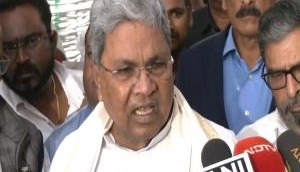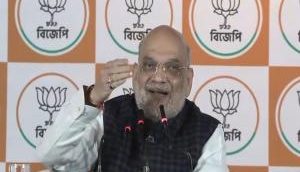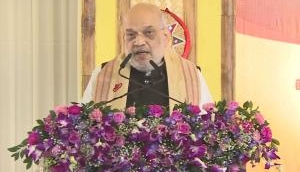
This is a contentious issue and as a Briton, I'll proceed cautiously. I actually studied this problem at university: the crimes committed by the empire are taught in history lessons across Britain. We are very transparent about our past and listening to Dr Tharoor's speech about the atrocities committed by the British, I did agree that reparations were needed to heal the wounds committed by the Raj.
However I would also argue that some good did come out of the empire, and India is profiting from it now in terms of the economic and social benefits.
Economic Argument
Dr Tharoor's statistics really hammered home his argument. Britain came to India through the East India trading company and the beginnings of the Raj were built upon economic foundations laid in place by this company. This led to the abhorrent exploitation of people, so that by the end of the British Raj, India had inherited an illiterate nation with a population too big to feed itself, and with stalled industrial development and inadequate infrastructure.
On the other hand, the British had set in motion the industrialisation of India. They put solid educational institutions in place, provided a telegraph system aiding communication across the country and provided a good railway system for its time.
Therefore, although the immediate effects of colonial rule left India in a poor state, the institutions and infrastructure the British had put in place may be partly responsible for the booming Indian economy today.
I would also argue against Dr Tharoor's opinion that British industrialisation was anchored on Indian de-industrialisation. Britain's industrialisation started in the late 1700s, and although it led to a slow decline of hand-looms and weavers in India, forms of mechanisation were also brought to India that opened new paths for employment.
In terms of economic reparations for India from Britain today, Dr Tharoor mentioned the minuscule amount Britain gave to India (0.4 per cent of India's GDP). Is money the way to make amends? I think that what was committed over the 200 years of the Raj cannot be reconciled by a blank cheque. If anything, that would be condescending and lazy.
Moral Argument
The racist nature of the empire had major implications upon the Indian population. Dr Tharoor mentioned the insensitivity of Churchill during the plight of the Bengal famine during which almost 4 million people died. Coupled with racism, the adjustment to the British capitalist economic model led to falls in the standard of living for many, whilst the rich became richer.
But on the other side of the coin, I believe the imposition of British rule brought with it a wave of social change.
The transformation of women within society is certainly something the British can look back on with pride. The banning of the Sati ritual in 1829 as well as the abolition of child marriages in 1898 saw the improvement of women in society and many women began to be educated. The British also brought structural changes to the education and healthcare system. For example, Britain introduced quinine as an anti-malarial antibiotic; they also undertook massive projects to improve sanitation, including urban water supplies.
Although sanitation was not wholly successful, the effects of a centralised government which was introduced by the British certainly benefited many Indian citizens. Britain united the many communities of India under their rule. Although this led to racial and communal tensions, it also meant that India could become the biggest democracy in the world, possibly a world superpower in the years to come.
Some of the atrocities committed by the British in India are beyond a simple apology. But that was a Britain of the past, one which thrived during the European era of imperialism. Today, Britain is different. The dark periods of its colonial past are not ignored but recognised and studied. There is recognition of the exploitation committed. Therefore I agree with Dr Tharoor's argument that Britain owes India reparations. An apology would help smooth relations but more needs to be done.
There have to be investments to help alleviate the poverty we caused. We helped create a huge wealth gap and we can certainly help close it through investments and social projects. Only once the British heal these wounds can we start to be forgiven for the 200 years of occupation.
Dr Shashi Tharoor's Argument
-India had 23 per cent of the Worlds GDP which came down to 4 per cent after the British arrived in India. Furthermore Sean Harkin the Economist believes that in the 17th century, India and China together would have made up around 60 to 70 per cent of the world's GDP.
-India was the biggest purchaser of British goods which had huge tariffs on them, leading to big tax revenues for Britain.
-The British induced famines like that in Bengal (with approx. 5 million deaths). Churchill denied aid to the Bengalis - but then Churchill was a racist and even refused to shake the hand of Lord Mountbatten on his return from India.
World War One: 1/6 forces Indian, 54,000 dead and 100 million pounds spent (in todays money).
World War Two: 2.5 million Indians, 1.25bn pounds spent (in todays money).
Railways and roads: Built with incentives for British investors at twice the cost of the Canadian and Australian railways.
Current British aid to India: 0.4 per cent of GDP.
Racial tensions heightened by British rule.
Britain is paying reparations to groups like the Maoris and other small groups.
Reparations can atone for what you have done - the principle of being paid not necessarily economically, but morally.
Counter Argument
Britain should be sorry for its past but there are some positives to take from the British occupation.
It is difficult to measure the effects of the Raj on the economy because it has to be viewed in the long and short term. In the short term as argued by Dr Tharoor, Britain obliterated hand-looms and weavers. However, in the long term, colonialism may have provided the pre-conditions for India to develop into what it is today.
Before the Raj, India was a primarily agrarian economy, Britain brought in a standardised and a more centralised economy. In the short term, this form of economic organisation meant that people's standard of living suffered. However, in the long run, it could lead to improvement.
The British created an institutionalised environment by importing their capitalist economic model.
Britain put in place educational institutions, and many leading Indian figures were taught at British Universities (Gandhi and Nehru both studied at Cambridge University). Britain also brought with the Raj a tide of social change for women.
Due to the prevailing trend of imperialism at the time, had the British not occupied India, the French or Portuguese, both of whom had footholds in the country, could have done so.
Had Britain not colonised India, the country may not have adopted Western values of democracy and economics, and followed a more Asian model.
How would reparations work?
Should we send more economic packages to alleviate the poverty? Or should our Prime Minister make a formal apology to the Indian people? Perhaps. But I feel that neither would really go far enough to make amends for 200 years of occupation.
Written by Jack Angela
Jack is an intern with Catch Live for the next few weeks. He is going into his third year at the University of Leeds, England, where he studies History and Arabic.








![BJP's Kapil Mishra recreates Shankar Mahadevan’s ‘Breathless’ song to highlight Delhi pollution [WATCH] BJP's Kapil Mishra recreates Shankar Mahadevan’s ‘Breathless’ song to highlight Delhi pollution [WATCH]](https://images.catchnews.com/upload/2022/11/03/kapil-mishra_240884_300x172.png)

![Anupam Kher shares pictures of his toned body on 67th birthday [MUST SEE] Anupam Kher shares pictures of his toned body on 67th birthday [MUST SEE]](https://images.catchnews.com/upload/2022/03/07/Anupam_kher_231145_300x172.jpg)






